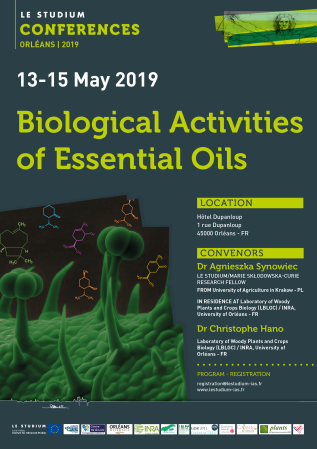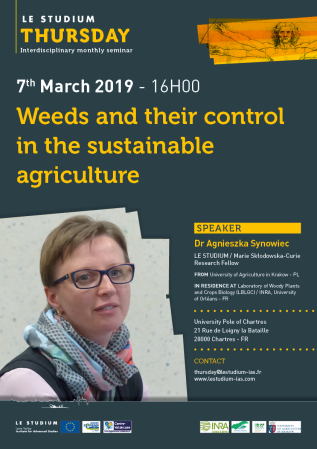Dr Agnieszka Synowiec

From
University of Agriculture in Krakow - PL
In residence at
Laboratory of Woody Plants and Crops Biology (LBLGC) / INRAe, University of Orléans - FR
Host scientist
Dr Christophe Hano
PROJECT
Biological effects of essential oils
Chemical intensification of agricultural production has led to significant pollution of soils and ground waters. It is also a cause of a significant decrease of biodiversity in agriculture. Taking these issues into account, there is an urgent need to find new solutions for pest management in agriculture, which are environmentally friendly and socially acceptable. This project aims on studying biological effects of essential oils, acquired from selected herbal plants, for fungal/bacterial-pest, weed and herbivory insect management. This project involves the development of innovative methods of essential oils application, as solid or liquid preparations.
Publications
This review article discusses the active constituents and potential of two menthol mint oils, Mentha piperita (MPEO) and Mentha arvensis (MAEO), as natural sources for botanical pesticides. The biological activities of these menthol mint oils, which can be useful in agriculture, have been broadly researched, especially toward phytotoxic microorganisms. To a lesser extent, the insecticidal and herbicidal activities of mint EOs have also been studied. It is apparent that the prospect of using menthol mint oils in agriculture is increasing in popularity. A number of investigations showed that the in vitro efficacy of MPEO and MAEO, as well as that of their main constituent, menthol, is pronounced. The results of in vitro research are useful for choosing EOs for further investigations. However, it is clear that in situ experiments are crucial and should be more extensively developed. At the same time, known techniques are to be applied to this area and new methods should be worked out, aiming at the improvement of EOs’ pesticidal efficacy and cost-effectiveness, for future implementation in agricultural pest control.
Final reports
During this fellowship I performed several greenhouse and laboratory experiments, aiming at assessing the phytotoxic and microbiological effects of microencapsulated peppermint (Mentha x piperita L.) essential oil (MPO). The different doses of MPO were applied in the pot experiments either into vermiculite or top layer of arable soils. As the acceptor-species, I used four maize cultivars, one cultivar of mustard and a weed– lambsquarters (Chenopodium album L.). The microbiological analyses were performed using i) commercial strain of arbuscular fungus Rhizophagus irregularis on maize roots by intersection method, and ii) natural soil-microbiota by FDA biotest. I have found, based on the ED50 analysis, that the phytotoxic effect of MPO is both dose and species as well as soil-medium dependent. The biochemical analyses revealed, that the plants’ response to the application of MPO is typical for the allelopathic stress. The microbiological responses to the MPO applications were not clear enough to conclude and should be continued further.



